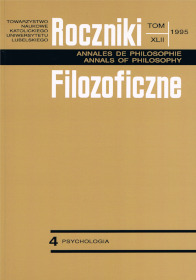Zdarzenia życiowe osoby ludzkiej. Podejście ekologiczne
Abstrakt
The model approach to structure and organization of ecosystem as a natural form has been made on the basis of J.J. Gibson's ecological approach. This model has inspired to define the principles of the system description and analysis of human life events. Undoubtedly the hitherto achievements in phenomenological and existential psychology are important here. It is the psychology oriented at the description of immediate experiences of Life world (Lebenswelt). However, this description is particularly oriented at the grasp of the aspects of human experiences with a view to the subject. Therefore a proposal to grasp the eccentric organization of human life events may be a source of inspiration to come up with a profound analysis of the subject of existence and his Life world as their fellow participants. The information about mutual affordance of the participants of events that a human being gives plays a special role in the organization of his or her life activity. This information bears a rather symbolic than abstract character. Moreover, the model grasps of existential events appears to be useful in the analysis of the events of personal dialogue, which makes the basis in grasping the person-existing-in-the world as the subject-matter of systematic psychological analysis. The presented here grasp of the structure and organization of human life events on the basis of the model of ecosystem may inspire to a system analysis of human activity, starting from its pre-conscious expressions to conscious symbolic information within the events of personal dialogue.
Bibliografia
Allport G.: Becoming. New Haven 1955; wyd. polskie: Osobowość i religia. Warszawa 1988.
Binswanger L.: The Existential Analysis School of Thought. W: R. May, E. Angel, H. F. Ellenberger (eds.). Eistence − a New Dimension in Psychiatry and Psychology. New York 1958 s. 191-213. Basic Books.
Bugental J. F. T.: W poszukiwaniu autentyczności. W: K. Jankowski (red.). Przełom w psychologii. Warszawa 1978.
Friedman M.: Existential Psychotherapy and the Image of Man. „Journal of Humanistic Psychology” 1964 nr 2 s. 104-117.
Friedman M.: To Deny Our Nothingness − Contemporary Images of Man. New York 1967.
Friedman M.: Dialogue and the Unique in Humanistic Psychology. „Journal of Humanistic Psychology” 1972 nr 2 s. 7-22.
Friedman M.: Dialogue and the Human Image. Beyond Humanistic Psychology. Newbury Park 1992. Sage Publications.
Gibson J. J.: The Ecological Approach to Visual Perception. Boston 1979. Houghton Mifflin Company.
Giorgi A. (ed.): Phenomenology and Psychological Research. Pittsburgh, Pa 1985. Duquesne University Press.
Giorgi A.: Psychologia jako nauka humanistyczna w świetle założeń podejścia fenomenologicznego. Tłum. Z. Uchnast. W: A. Januszewski, Z. Uchnast, T. Witkowski (red.). Wykłady z psychologii w KUL. T. 5. Lublin 1991 s. 309-344.
Heidegger M.: Sein und Zeit. Halle 1927.
Husserl E.: Kryzys europejskiego człowieczeństwa a filozofia. Warszawa 1993. Biblioteka Aletheia. (Wykład wygłoszony w Wiedniu 1935 r.)
Jourard S.: Disclosing Man to Himself. Princeton, N. J. 1968. Van Nostrand.
Koffka K.: Principles of Gestalt Psychology. New York 1935. Harcourt, Brace.
Kaam A. van: Existential Foundations of Psychology. Pittsburgh, Pa 1969. Duquesne University Press.
Köhler W.: Gestalt Psychology. New York 1947. Liveright Publ. Corp.
Krasnodębski Z. (red.): Świat przeżywany. Fenomenologia i nauki społeczne. Warszawa 1993. PIW.
Luijpen W. A.: Fenomenologia egzystencjalna. Warszawa 1972. IW Pax.
May R.: Contributions of Existential Psychotherapy. W: R. May, E. Angel, H. F. Ellenberger (eds.). Existence − a New Dimension in Psychiatry and Psychology. New York 1958 s. 37-91. Basic Books.
May R.: Psychologia i dylemat ludzki. Warszawa 1973. IW Pax.
Piłat R.: Czy istnieje świadomość? Warszawa 1993. Instytut Filozofii i Socjologii PAN.
Polanyi M.: The Tacit Dimension. Garden City, N. Y. 1966. Doubleday.
Rogers C.: Becoming a Person. Boston 1961.
Rogers C.: Uczyć się jak być wolnym. W: J. Jankowski (red.). Przełom w psychologii. Warszawa 1978.
Straus E.: Aesthesiology and Hallucinations. W: R. May, E. Angel, H. F. Ellenberger (eds.). Existence − a New Dimension in Psychiatry and Psychology. New York 1958 s. 139-169. Basic Books.
Uchnast Z.: Podstawy psychologicznej analizy w świetle założeń psychologii postaci i psychologii fenomenologicznej. W: A. Biela, Z. Uchnast, T. Witkowski (red.). Wykłady z Psychologii w KUL w roku akademickim 1985/86. Lublin 1988 s. 11-68.
Uchnast Z.: Reinterpretacja założeń psychologii postaci: Od modelu całości jako symbolicznej figury do modelu całości naturalnej jako ekosystemu. „Roczniki Filozoficzne” 42:1994 z. 4 s. 33-71.
Uchnast Z.: Ku psychologii zdarzeń życiowych. W: A. Biela, J. Brzeziński, T. Marek (red.): Społeczne, eksperymentalne i metodologiczne konteksty procesów poznawczych człowieka. Poznań 1995 s. 117-138. Wydawnictwo Fundacji Humaniora.
Wertheimer M.: Über das Denken der Naturvölker, Zahlen und Zahlgebilde. „Zeitschrift für Psychologie” 1912 nr 60 s. 321-378.
Copyright (c) 1995 Roczniki Filozoficzne

Utwór dostępny jest na licencji Creative Commons Uznanie autorstwa – Użycie niekomercyjne – Bez utworów zależnych 4.0 Międzynarodowe.





